Applying for a Canada PR Visa is a structured process that involves meeting specific eligibility requirements, submitting verified documents, and following the official Canada PR process through recognized immigration pathways. Whether you’re a skilled worker, student, or family applicant, understanding how to apply for Permanent Residency in Canada ensures a smooth and successful application journey.
A Canada PR (Permanent Resident) Visa allows skilled professionals, families, and students to make Canada their permanent home. With this visa, you can live, work, and study anywhere in Canada permanently, while enjoying many of the same rights and benefits as Canadian citizens.
Permanent Residency (PR) means you are legally authorized to stay in Canada indefinitely without being a citizen. PR holders receive a Permanent Resident Card, which serves as official proof of their status and allows them to re-enter Canada freely. As a permanent resident, you can access free public healthcare, world-class education, social benefits, and a pathway to Canadian citizenship after meeting the required residency period.
Canada offers multiple pathways to obtain permanent residency, including Express Entry for skilled professionals, Provincial Nominee Programs (PNPs) for applicants nominated by provinces, and Family Sponsorship for individuals joining loved ones already living in Canada. Each of these programs is designed to attract global talent, strengthen communities, and support the country’s long-term economic growth.
The Government of Canada continues to expand its immigration targets to welcome more newcomers in the coming years, reaffirming its commitment to skilled immigration and inclusivity.
Applying for a Canada Permanent Residency (PR) Visa offers stability, freedom, and long-term opportunities for you and your family. As a PR holder, you gain key benefits that make Canada one of the most desirable destinations for skilled professionals and migrants worldwide.
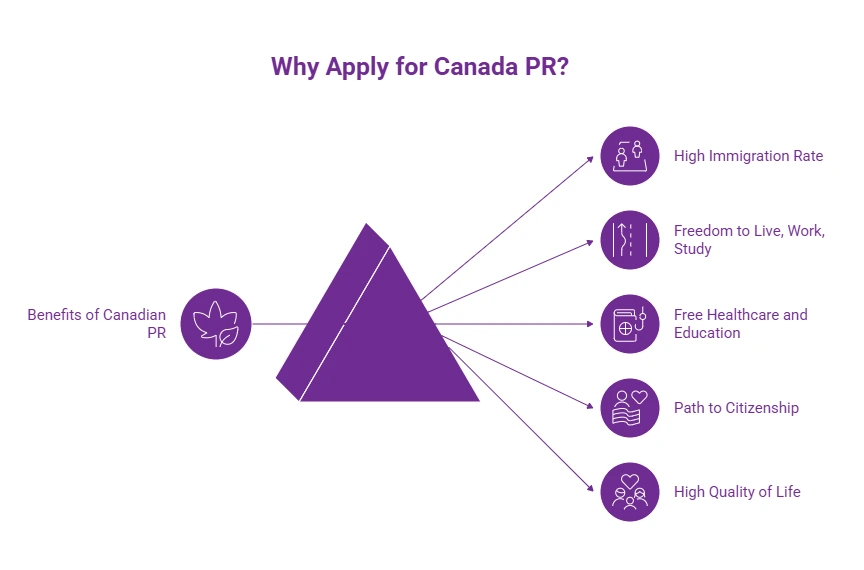
Canada offers several immigration pathways to obtain Permanent Residency (PR), each tailored to different applicant profiles such as skilled professionals, families, and entrepreneurs. These programs are managed by Immigration, Refugees and Citizenship Canada (IRCC) and provincial governments to attract talent that supports Canada’s growing economy.
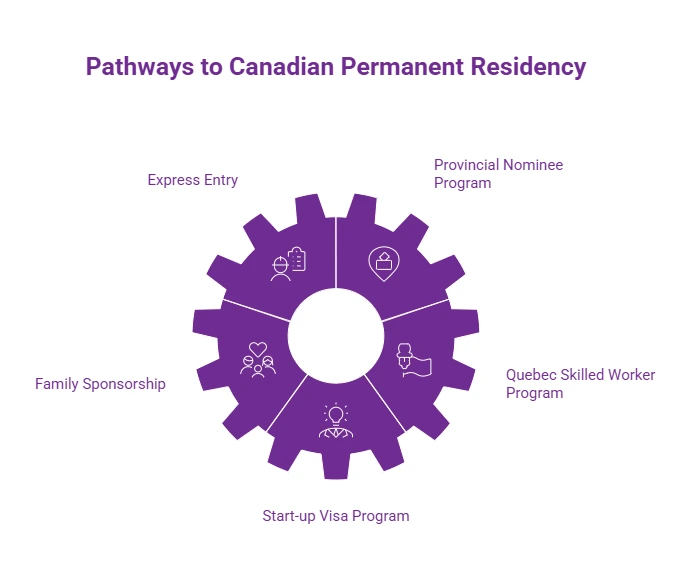
The Express Entry System is Canada’s primary pathway for skilled professionals seeking permanent residency. It operates through a points-based selection model known as the Comprehensive Ranking System (CRS), where candidates are ranked based on factors like age, education, work experience, and language proficiency.
Programs under Express Entry:
*Want to apply for Express Entry? Let Y-Axis guide you with the process.
The Provincial Nominee Programs (PNPs) allow provinces and territories to nominate candidates who meet their regional labour market needs. Each province has its own streams for skilled workers, graduates, and entrepreneurs.
Popular PNPs include:
Applicants can apply directly to a province (base stream) or through an Express Entry–linked stream, which provides a significant CRS advantage.
*Want to apply for Canada PNP? Get in touch with experts at Y-Axis to assist you with the steps.
The Family Sponsorship Program enables Canadian citizens and permanent residents to bring close family members to Canada. Eligible relationships include spouse or common-law partner, dependent children, and, in some cases, parents and grandparents.
Sponsors must be financially stable and agree to support their sponsored relatives once they arrive in Canada. This program is central to Canada’s goal of reuniting families and maintaining strong community ties.
The Business and Investor Immigration pathway is designed for entrepreneurs, investors, and self-employed individuals who can contribute to Canada’s economy through business creation and innovation.
Key options include:
These programs support innovation, attract investment, and create employment opportunities for Canadians.
To qualify for a Canada PR Visa, applicants must meet specific eligibility requirements set by Immigration, Refugees and Citizenship Canada (IRCC). These criteria are evaluated under points-based systems such as Express Entry and Provincial Nominee Programs (PNPs). The following table outlines the core factors used to assess eligibility for Canada PR.
| Eligibility Factor | Requirements (as per IRCC guidelines) |
| Age | Applicants aged 18 to 35 receive the highest CRS points. Points gradually decrease after age 35 and reach zero at 45. There is no upper age limit, but age affects selection scores. |
| Education | Must have completed secondary or post-secondary education equivalent to a Canadian qualification. Foreign credentials require an Educational Credential Assessment (ECA) from a designated body such as WES, IQAS, ICES, or CES. |
| Work Experience | Minimum of one year of full-time (or equivalent part-time) skilled work experience in an eligible occupation classified under TEER 0, 1, 2, or 3 of the National Occupational Classification (NOC 2021). |
| Language Proficiency | Applicants must prove English or French proficiency through approved tests: IELTS General, CELPIP-General, PTE Core, TEF Canada, or TCF Canada. Minimum language levels depend on the program (usually CLB 7 or higher). Results are valid for two years. |
| Proof of Funds | Required for Federal Skilled Worker (FSW) and Federal Skilled Trades (FST) applicants unless they have a valid job offer or are already working in Canada. The minimum funds requirement is updated annually by IRCC (as of 2025, CAD 15,263 for a single applicant). |
| Job Offer (Optional) | A valid job offer from a Canadian employer can improve your CRS score and support PNP nomination, though it is not mandatory under Express Entry. |
| Adaptability Factors | Additional points may be awarded for factors like Canadian education, previous work experience in Canada, spouse’s qualifications, or a sibling in Canada who is a citizen or PR holder. |
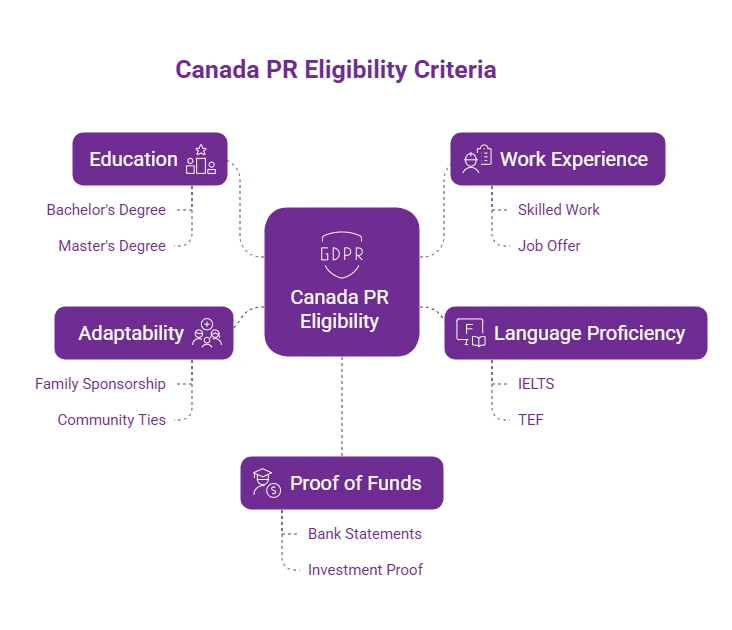
Follow these key steps to apply for a Canada PR Visa through the official IRCC process.
Step 1: Check Your Eligibility
Confirm you meet the eligibility criteria for programs like Express Entry or PNP based on age, education, work experience, and language proficiency.
Step 2: Get Your Documents Ready
Prepare essential documents — passport, ECA report, language test results, proof of work experience, proof of funds, police clearance, and medical exam.
Step 3: Create an Express Entry Profile
Submit your profile on the IRCC portal and receive a Comprehensive Ranking System (CRS) score based on your credentials.
Step 4: Receive an Invitation to Apply (ITA)
If your CRS score meets the cutoff in an IRCC draw, you’ll receive an Invitation to Apply for PR. You have 60 days to submit a complete application.
Step 5: Submit Your PR Application
Upload your documents, pay the required fees, and complete biometrics if requested. IRCC’s average processing time for Express Entry PRs is about 6 months.
Step 6: Get Confirmation of PR Status (COPR)
Once approved, IRCC issues your Confirmation of Permanent Residence (COPR) and PR card, allowing you to live, work, and study permanently in Canada.
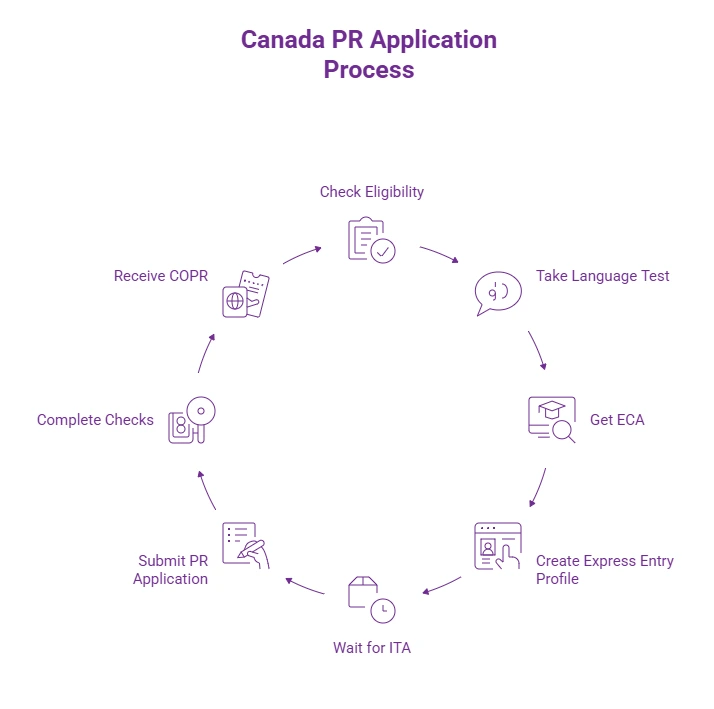
The time it takes to process a Canada PR Visa depends on the immigration program you apply under and how complete your application is. The Immigration, Refugees and Citizenship Canada (IRCC) aims to process most complete permanent residence applications within set service standards.
Below are the average processing timelines for different PR streams based on the latest IRCC updates.
| Application Type | Average IRCC Processing Time |
| Express Entry (Federal Skilled Worker, Skilled Trades, CEC) | Around 6 months for most complete applications |
| Express Entry–aligned PNP Streams | Approximately 6–8 months |
| Non–Express Entry PNP (Base Streams) | Can take 12 months or more, depending on province and stream |
| Family Sponsorship (Spouse/Partner) | Around 10–12 months on average |
| Business/Investor Immigration | Varies by program (typically 12–24 months) |
Note: Processing times are updated regularly by IRCC and may vary depending on program intake, background checks, and document completeness.
Applying for a Canada PR Visa involves paying government processing fees to Immigration, Refugees and Citizenship Canada (IRCC). These fees cover the cost of reviewing your application, issuing your Confirmation of Permanent Residence (COPR), and granting permanent resident status. The table below outlines the latest IRCC fee structure, applicable to all PR categories.
| Applicant Category | IRCC Fee (CAD) | Details |
| Principal Applicant | 1,210 | Includes CAD 635 processing fee + CAD 575 Right of Permanent Residence Fee (RPRF) |
| Spouse or Common-Law Partner | 1,210 | Same breakdown as above |
| Dependent Child | 175 per child | Applies to each accompanying dependent |
| Biometrics (per person) | 85 | Maximum CAD 170 for a family |
| Permanent Resident Card | 50 | Issued after confirmation of PR status |
| Replacement/Travel Document | 50 | For returning permanent residents |
The Comprehensive Ranking System (CRS) is the points-based method used by Immigration, Refugees and Citizenship Canada (IRCC) to rank candidates in the Express Entry pool for permanent residency. Your CRS score determines your position in the pool and your chances of receiving an Invitation to Apply (ITA) for PR.
The CRS awards points based on four main factors:
*Want to check your eligibility to Canada? Try out the FREE Canada Immigration points calculator to get an instant score!
As a Canadian Permanent Resident (PR), you gain access to nearly all the same rights and privileges as Canadian citizens, along with long-term stability and opportunities for your family. The key benefits of holding PR status include:
PR holders can reside and work in any province or territory without employer or regional restrictions.
Permanent residents qualify for provincial and territorial health insurance, covering essential medical services under Canada’s publicly funded system.
Children of PR holders can attend public schools at no cost, and post-secondary education is offered at subsidized domestic tuition rates.
After living in Canada for 1,095 days (three years) within five years, PRs can apply for Canadian citizenship.
PR holders are protected under the Canadian Charter of Rights and Freedoms, ensuring equality, safety, and access to justice.
To keep your Permanent Resident (PR) status valid, you must meet specific residency and compliance requirements set by Immigration, Refugees and Citizenship Canada (IRCC). Failing to meet these can result in loss of status or PR card renewal refusal.
Residency Obligation – 730 Days Rule
PR holders must live in Canada for at least 730 days (two years) within every five-year period to maintain their status. These days do not need to be continuous and can include time spent abroad with a Canadian citizen spouse or while employed full-time by a Canadian company.
Renewing Your PR Card
The PR card is usually valid for five years and serves as proof of your permanent resident status when travelling. You should apply for renewal at least six months before expiry if you plan to travel outside Canada. Your PR status itself does not expire even if the card does.
Avoiding PR Revocation
PR status may be revoked if you fail to meet residency requirements, commit serious crimes, or provide false information in your application. If your status is under review, you may appeal to the Immigration Appeal Division (IAD) within the allowed timeframe.
After becoming a permanent resident, you can take the next step toward Canadian citizenship once you meet the eligibility criteria. Citizenship offers lifelong security, expanded rights, and greater global mobility.
To apply for Canadian citizenship, you must:
Y-Axis, the leading overseas immigration consultancy in the UK, provides unbiased immigration services for every client based on their interests and requirements.
The impeccable services of Y-Axis include:
Our Accreditations | |||
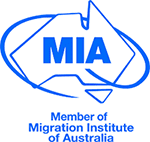 | 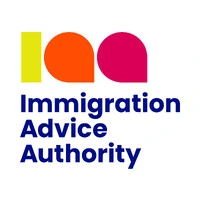 | 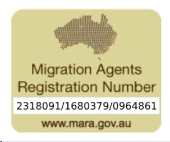 | 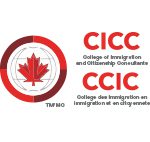 |
Explore what Global Citizens have to say about Y-Axis in shaping their future
Canada PR Visa
One of our client Urvashi Sharma has opt
Read More...
Canada PR Visa
Sharath S giving feedback after receivin
Read More...
Canada PR Visa
Y-Axis received a great feedback from Ak
Read More...
Canada does not grant permanent residency based on years of residence alone. However, most individuals become eligible for PR through immigration programs like Express Entry or Provincial Nominee Programs. If you are residing in Canada on a temporary visa (such as a work or study permit), you can apply for PR once you meet specific eligibility criteria. On average, it may take 1–3 years to gain PR status through these routes.
The processing time for Canada PR varies depending on the program. Express Entry applications are typically processed within 6 months after receiving the Invitation to Apply (ITA), whereas Provincial Nominee Programs (PNPs) may take 12 to 18 months. Delays can occur based on documentation, background checks, and country of residence.
The minimum IELTS bands required to apply for Canada PR depend on your chosen pathway. A detailed description is given in the list below:
There is no strict age limit for applying for Canadian PR. However, the age factor in the CRS system favors applicants between 18 and 35 years. Those older than 35 receive fewer points, though other factors like work experience and language proficiency can still make you eligible.
Yes, UK residents are eligible to apply for Canada PR through multiple pathways such as Express Entry, PNPs, family sponsorship, or through a Canadian employer. You must meet eligibility requirements including education, language proficiency, and work experience.
Step 1: Identify the most suitable immigration program for you (e.g., Express Entry, PNP, AIP, Family Sponsorship, Caregiver, Start-Up Visa).
Step 2: Check your eligibility based on factors like age, work experience, education, and language ability.
Step 3: Take an approved language test (e.g., IELTS, CELPIP, TEF) and get your educational credentials assessed (ECA).
Step 4: Create an online profile or apply to a provincial program, depending on your chosen pathway.
Step 5: Receive an Invitation to Apply (ITA) or provincial nomination, if required.
Step 6: Submit your complete permanent residency application with all required documents and fees.
Step 7: Complete medical exams, provide police clearance certificates, and submit biometrics.
Step 8: Wait for a decision from IRCC and receive your Confirmation of Permanent Residence (COPR) if approved.
If you are an overseas skilled worker, you must opt for the FSW – Federal Skilled Worker stream to apply for Canada PR. You must score at least 67 points for the FSW stream. This is based on your French/English language proficiency, work experience, education, and age for creating a profile. You will enter the pool of candidates in the Express Entry system if selected.
You need a minimum of IELTS 6.0 in each band (Listening, Reading, Writing, and Speaking) for most PR programs under Express Entry. This meets CLB 7. Some occupations may require higher proficiency, especially in regulated professions.
To get a PR visa, you must determine your eligibility under a suitable immigration program, take language tests (IELTS or CELPIP), get your credentials assessed (ECA), and create an Express Entry profile. Once invited, you submit a complete PR application with biometrics and police clearance.
Canada PR visa is valid for five years
PR visa holders should be aware of the expiration date of their PR visa.
They will have to submit their renewal application six months before their PR visa expires.
The cost for applying through Express Entry includes:
Note: Additional costs may include language tests, ECA fees, medical exams, and police certificates.
Application fees for PNPs vary by province. For example:
Note: Some provinces, like Alberta and Nova Scotia, do not charge application fees. These fees are in addition to the federal processing fees.
The primary differences between Canada PR and Canada citizenship are given below.
| Features | Canadian PR | Canadian Citizen | |
| Voting Rights | Canadian PRs do not have voting rights in Canadian elections. | Canadian citizens have the right to vote in Canadian elections. | |
| Working Rights | Canadian PRs can apply for jobs in various sectors, except specific jobs that require security clearance. | Canadian citizens have total rights to work in Canada. | |
| Passport of Canada | Canada PR holders are not eligible to apply for a Canadian passport. | Canadian citizens are eligible to apply for a passport in Canada. | |
| Freedom to travel | Canadian PRs can travel to any country and their home country for a particular amount of time. | Canadian citizens can travel visa-free to multiple countries. | |
| Passing status to children born outside Canada | Canada PRs cannot pass the PR status to their children. They must apply for Canada PR separately. | Canadian citizens can pass their citizenship to children born outside Canada. |
The "best" pathway depends on your profile. Express Entry suits skilled workers with strong language, education, and work credentials. For those with specific provincial ties or job offers, PNP streams offer targeted routes, even without the highest CRS scores. Family sponsorship is ideal for those with Canadian relatives, while AIP or caregiver programs support job-specific cases. Evaluate your qualifications and goals to choose a suitable option.
To become a permanent resident of Canada, you typically need to meet the following requirements:
Below are the primary immigration programs through which individuals can apply for Canadian PR:
Yes, Y-Axis can assist you with professional guidance for Canadian permanent residency. Our team includes experienced consultants who are well-versed in all major Canadian immigration programs, including Express Entry, PNPs, and family sponsorship. While the Government of Canada requires all paid representatives to be authorized by the College of Immigration and Citizenship Consultants (CICC), Y-Axis ensures that your case is handled ethically and transparently. We provide end-to-end support—from profile assessment to application filing—while maintaining high standards of service and compliance.
Step 1: Determine which immigration program you qualify for (e.g., Express Entry, PNP, AIP).
Step 2: Complete the eligibility requirements, such as language tests and Educational Credential Assessment (ECA).
Step 3: Create an online profile or submit an application based on the program's process.
Step 4: Receive an Invitation to Apply (ITA) or provincial nomination, if applicable.
Step 5: Submit your complete PR application with supporting documents and fees.
Step 6: Provide biometrics and complete a medical exam and police clearance.
Step 7: Wait for IRCC to process your application and issue your Confirmation of Permanent Residence (COPR).
Step 8: Land in Canada or confirm your status to officially become a permanent resident.
If you need help with your permanent resident (PR) application, there are several trusted sources. You can visit the official IRCC website for detailed application guides, document checklists, and processing tools. For personalized support, consider consulting a licensed immigration representative, such as a lawyer or a Regulated Canadian Immigration Consultant (RCIC), authorized by the College of Immigration and Citizenship Consultants (CICC). If you prefer end-to-end guidance, Y-Axis offers expert assistance, from profile assessment and documentation to final submission, ensuring compliance with all IRCC requirements while making the process easier and stress-free.